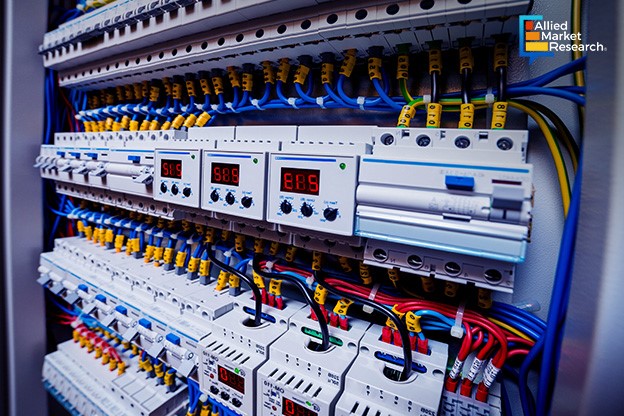Electric Control Panel: A Functional Unit of Industrial Electric Infrastructure

30 Jul
2024
Highlights
- Introduction
- Technological advancements in electric control panel
- Recent developments in the industry
Electric control panels are integral for industrial processes and machinery, much like a computer’s central processing unit. They manage and synchronize all the components necessary for machinery to function. The main role of an electrical panel is to regulate electricity flow and track the operation of the connected machinery. It usually features a user interface with indicators and control buttons that offer real-time feedback and allow manual adjustments.
Electric control panels significantly enhance efficiency and productivity by optimizing processes. They automate repetitive tasks, ensuring consistent and precise operation. This automation reduces the need for manual intervention and minimizes downtime, thereby boosting productivity and positively affecting a business's bottom line. These panels manage and distribute electrical power within electric vehicles. They ensure the efficient operation of systems such as battery management, electronic devices, and vehicle charging mechanisms. The electric control panel industry is projected to cite a noteworthy CAGR of 5.8% during the forecast period.
Evolution of electrical panels through HMI and real-time data visualization
User-friendly interfaces are essential in electrical panel technology. Future panels are expected to include intuitive touchscreens, clear visualizations, and simplified controls. These advancements enhance usability, shorten the learning curve, and enable operators to monitor and manage electrical systems with ease. An HMI (Human-Machine Interface) enhances the efficiency of an electrical control panel by improving the interaction between operators and the control system. This leads to more effective control, better monitoring, and improved decision-making.
It offers real-time data visualization, allowing operators to monitor and control the system more efficiently while minimizing manual checks. By using touch-sensitive screens or other interactive interfaces, the HMI simplifies navigation through menus, adjustment of settings, and performance monitoring. This ease of use helps reduce errors and enhances overall efficiency. Moreover, HMIs interact with Programmable Logic Controllers (PLCs) and input/output sensors to gather and display real-time data. This interaction allows operators to review and monitor processes, diagnose issues, and visualize data effectively.
Streamlined process management and performance optimization with SCADA
SCADA (Supervisory Control and Data Acquisition) is a system composed of various hardware and software components that work together to allow operators to monitor and manage processes within a plant or facility. These systems are essential for electric control panels, significantly boosting their functionality and efficiency. Operators remotely optimize device performance without physical presence at the site, which reduces downtime and enhances efficiency. By monitoring the performance of individual components, they pinpoint areas for improvement and implement corrective actions as needed. SCADA gathers historical data from switchboards, enabling operators to perform diagnostics, optimize system performance, and analyze trends. This data is used to predict equipment failures, implement preventive maintenance strategies, and identify inefficiencies.
Span’s smart electric control panels
Home energy management company Span broadened its range of smart electrical panels and related products in March 2024. This expansion provides customers access to Span's energy management feature, PowerUp. The featured products are Span Meter 8, Span Panel 16/24 for major electric load, Span Panel 32 for home backup management, and many more. With PowerUp, homeowners electrify their homes safely and gain enhanced visibility and control to reduce energy costs.
Schneider Electric introduced a flexible solution that enhances smart panel functionality for electrical systems
In July 2023, an expert in digital energy management and automation, Schneider Electric, unveiled a new modular and flexible solution that integrates smart panel functionality into standard home electrical systems. This new offering, which includes Square D Control Relays and the Schneider Energy Monitor, provides homeowners with app-based control. It features simpler installation and comes at a lower cost compared to existing smart panel options. These solutions can be installed quickly and easily by a licensed electrician.
To conclude, electric control panels are highly essential for managing and optimizing industrial and EV systems. Advances in HMI and SCADA technologies improve their efficiency with real-time data visualization and remote management. Moreover, innovations are making these systems more accessible and user-friendly, enhancing energy management, and improving operational performance.
For more details regarding investment opportunities in the electric control panel market, feel free to contact us!

Koyel Ghosh
Author’s Bio- Koyel Ghosh is a blogger with a strong passion and enjoys writing in miscellaneous domains, as she believes it lets her explore a wide variety of niches. She has an innate interest in creativity and enjoys experimenting with different writing styles. A writer who never stops imagining, she has been serving the corporate industry for the last five years.
Gas Insulated Switchgear (GIS) Systems: The Smart Investment for Efficient and Resilient Energy Distribution
Avenue: Entire Library membership of Allied Market Research Reports at your disposal
- Avenue is an innovative subscription-based online report database.
- Avail an online access to the entire library of syndicated reports on more than 2,000 niche industries and company profiles on more than 12,000 firms across 11 domains.
- A cost-effective model tailored for entrepreneurs, investors, and students & researchers at universities.
- Request customizations, suggest new reports, and avail analyst support as per your requirements.
- Get an access to the library of reports at any time from any device and anywhere.
Related Post
-
How are Submarine Cables Transforming Global Connectivity with Enhanced User Experience?
-
Endoscopy Procedures: Transformations in Techniques and Applications
-
AI-Powered Video Analytics: How the Product Actually Works for enterprises
-
Painting Robots: Transforming Precision Coating and Creative Applications
-
Innovations in Pharmacovigilance Systems Advancing Patient Safety
-
Understanding Edge Security: Keeping Data Safe Near the Source
-
Exploring the Use and Advancements of 3D Laser Scanners in Professional Applications
-
Reinforcing Industrial Controls with Smarter Tools and Training








